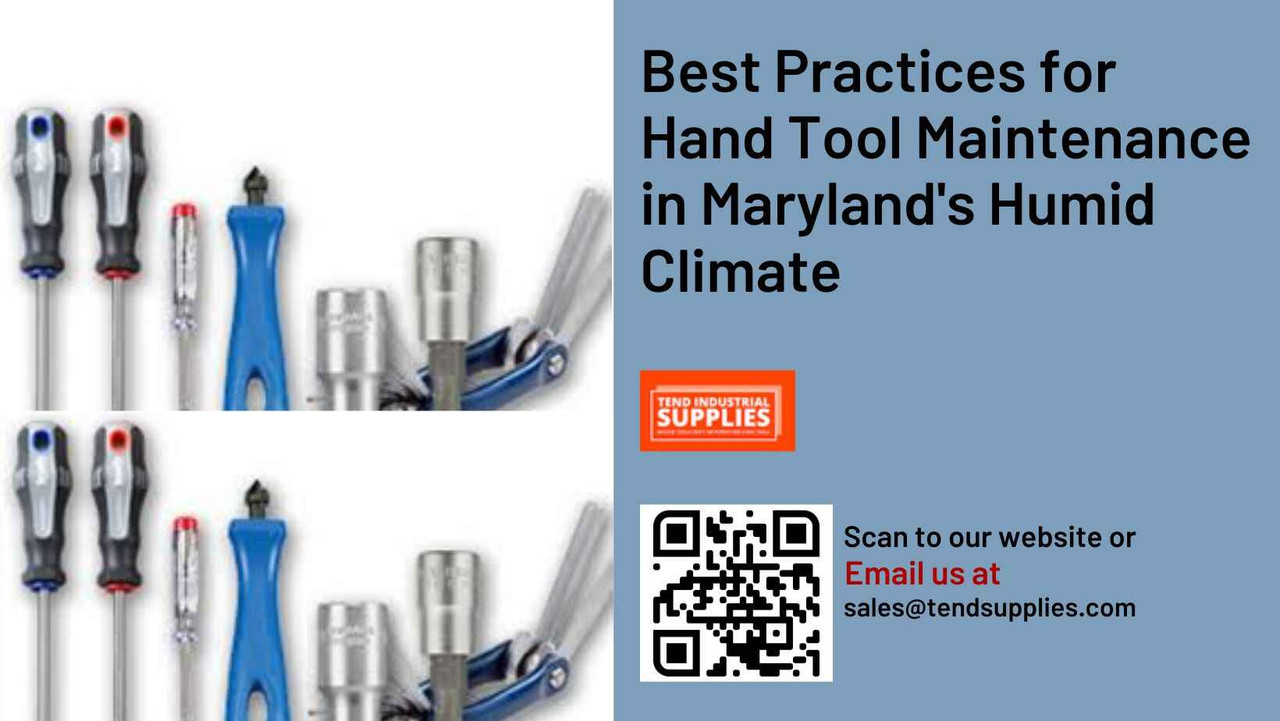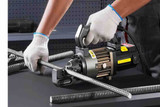Best Practices for Hand Tool Maintenance in Maryland's Humid Climate
Key Takeaway
Implementing a proactive maintenance routine tailored to Maryland's humid climate can significantly extend the life of your hand tools, improve their performance, and reduce replacement costs. By understanding the impact of humidity on different materials and adopting the right storage and care techniques, you can keep your tools in top condition year-round.
Introduction
Maryland's humid climate presents unique challenges for hand tool maintenance. With average humidity levels often exceeding 70%, tools are at constant risk of rust, corrosion, and degradation. This comprehensive guide explores the best practices for maintaining hand tools in Maryland's humid environment, ensuring longevity, performance, and safety for professionals and DIY enthusiasts alike.
From construction sites in Baltimore to woodworking shops in Annapolis, proper tool maintenance is crucial for operational efficiency and cost-effectiveness. This guide will provide valuable insights into protecting your investment in hand tools while navigating the challenges posed by Maryland's climate.
Understanding Maryland's Climate and Its Impact on Hand Tools
Maryland's climate is characterized by hot, humid summers and relatively mild winters. This combination creates an environment where moisture is a constant concern for tool maintenance.
Climate Factors Affecting Tools:
- High Humidity: Average relative humidity often exceeds 70%, especially during summer months.
- Temperature Fluctuations: Can lead to condensation on tool surfaces.
- Proximity to Water: Many areas in Maryland are near bodies of water, increasing ambient moisture.
Impact on Different Tool Materials:
- Metal Tools: Prone to rust and corrosion
- Wooden Handles: Risk of swelling, warping, or developing mold
- Rubber and Plastic Components: May degrade faster in humid conditions
Essential Maintenance Practices
1. Cleaning
Regular cleaning is the foundation of effective tool maintenance in humid climates.
Best Practices:
- Clean tools after each use to remove dirt, moisture, and potential corrosive substances.
- Use appropriate cleaning solutions for different materials (e.g., metal cleaners, wood-safe products).
- Dry tools thoroughly immediately after cleaning.
Tool-Specific Tips:
- For power tools, consult manufacturer guidelines for safe cleaning procedures.
- Use compressed air to clean hard-to-reach areas in complex tools.
2. Rust Prevention
In Maryland's humid environment, rust prevention is critical for metal tools.
Techniques:
- Apply a thin coat of rust-inhibiting oil or spray after cleaning.
- For long-term storage, consider using vapor corrosion inhibitors (VCI).
- Regularly inspect tools for early signs of rust and address immediately.
Product Recommendations:
- WD-40 Specialist Long-Term Corrosion Inhibitor
- Boeshield T-9 Rust & Corrosion Protection
3. Proper Storage
Correct storage is crucial for protecting tools from Maryland's humid air.
Storage Solutions:
- Use airtight toolboxes or cases with moisture-absorbing packets.
- Consider climate-controlled storage for valuable or sensitive tools.
- Implement wall-mounted tool storage to keep tools off potentially damp floors.
Environmental Control:
- Use dehumidifiers in workshops and storage areas.
- Maintain good air circulation to prevent moisture buildup.
4. Regular Inspection and Maintenance
Proactive inspection helps catch and address issues early.
Inspection Routine:
- Conduct weekly visual inspections of all tools.
- Check for signs of rust, loose parts, or damage.
- Test moving parts for smooth operation.
Maintenance Tasks:
- Lubricate moving parts regularly.
- Sharpen cutting edges as needed.
- Replace worn parts promptly to prevent further damage.
5. Material-Specific Care
Different tool materials require tailored care approaches.
Metal Tools:
- Apply light machine oil to prevent rust.
- Use silica gel packets in toolboxes to absorb moisture.
Wooden Handles:
- Apply linseed oil or wood preservative to prevent moisture absorption.
- Store in a dry environment to prevent warping.
Power Tools:
- Remove batteries and store separately in a dry place.
- Use moisture-resistant cases for storage and transport.
Seasonal Considerations
Maryland's seasonal changes require adjustments to maintenance routines.
Summer Maintenance:
- Increase frequency of cleaning and rust prevention applications.
- Ensure proper ventilation in storage areas.
- Consider using portable dehumidifiers on job sites.
Winter Maintenance:
- Protect tools from temperature fluctuations when moving between heated and unheated areas.
- Address condensation quickly when tools are brought indoors.
- Maintain consistent temperature in storage areas to prevent moisture buildup.
Tool Maintenance Kits
Assembling a comprehensive maintenance kit is essential for Maryland professionals and hobbyists.
Essential Items:
- Cleaning cloths and brushes
- Rust inhibitor sprays or oils
- Lubricants for moving parts
- Moisture-absorbing packets
- Sharpening tools
- Small tool repair kit
Safety Considerations
Proper maintenance is crucial for tool safety and performance.
Safety Tips:
- Always follow manufacturer guidelines for maintenance and use.
- Wear appropriate personal protective equipment (PPE) when cleaning or maintaining tools.
- Ensure tools are completely dry before use, especially power tools.
- Regularly inspect safety features and guards for proper function.
Professional Maintenance Services
For specialized or high-value tools, professional maintenance may be beneficial.
When to Consider Professional Services:
- Complex power tools requiring calibration
- Precision instruments affected by humidity
- Large-scale maintenance for professional workshops
Finding Reputable Services:
- Consult with tool manufacturers for authorized service centers.
- Seek recommendations from industry associations or fellow professionals.
Case Studies
1. Construction Company in Baltimore
A Baltimore-based construction company implemented a comprehensive tool maintenance program tailored to Maryland's humid climate. By introducing climate-controlled storage containers on job sites and mandating daily cleaning and oiling of metal tools, they observed:
- 30% reduction in tool replacement costs over one year
- Improved tool performance and reliability
- Decreased downtime due to tool malfunctions
2. Woodworking Shop in Annapolis
An Annapolis woodworking shop struggled with wooden tool handles warping and developing mold. After implementing the following changes:
- Installing dehumidifiers in the workshop
- Applying wood preservatives to all wooden handles
- Creating a dedicated, climate-controlled storage area for hand tools
Results included:
- Extended lifespan of wooden-handled tools by an average of 2 years
- Improved grip and safety due to maintained handle integrity
- Reduction in wood filler and repair costs
These case studies highlight the significant impact that tailored maintenance practices can have on tool longevity and performance in Maryland's humid environment.
Frequently Asked Questions
1. How often should I clean and oil my hand tools in Maryland's climate?
In Maryland's humid climate, it's advisable to clean and oil metal hand tools after each use, or at least weekly if used frequently. For tools used less often, monthly maintenance should suffice. However, always clean tools immediately after exposure to moisture or corrosive substances.
2. What's the best way to store power tools in a non-climate-controlled garage in Maryland?
For storing power tools in a non-climate-controlled garage, use airtight toolboxes or cases with moisture-absorbing packets. Consider adding a portable dehumidifier to the garage. Remove batteries from cordless tools and store them separately in a dry, cool place. Periodically run the tools to prevent seizing of moving parts.
3. Can I use regular household oil for lubricating my tools?
While household oils can provide temporary protection, they're not ideal for long-term tool maintenance. Use purpose-made tool oils or lubricants that offer better protection against rust and corrosion. Products like 3-in-1 oil or specific tool lubricants from reputable manufacturers are more suitable for Maryland's humid conditions.
4. How do I prevent my wooden tool handles from swelling or warping?
To protect wooden tool handles in Maryland's humid climate, regularly apply a coat of boiled linseed oil or a specialized wood preservative. Store tools in a dry environment, ideally with some form of climate control. Consider using silica gel packets in your toolbox to absorb excess moisture.
5. What signs indicate that humidity has started to affect my tools?
- Early signs of humidity damage include:
- Light surface rust on metal parts
- Sticky or swollen wooden handles
- Musty odors in storage areas
- Condensation inside tool cases
- Stiff or resistant movement in articulated parts If you notice any of these signs, take immediate action to clean, dry, and protect your tools.
Conclusion
Maintaining hand tools in Maryland's humid climate requires diligence, but the rewards are significant. By implementing the best practices outlined in this guide, you can extend the life of your tools, ensure their optimal performance, and maintain a safe working environment. Regular cleaning, proper storage, and proactive maintenance are key to protecting your investment in quality hand tools.
As climate patterns continue to evolve, staying informed about the latest in tool care technologies and techniques is crucial. Embrace these maintenance practices as an integral part of your work routine, and you'll find that your tools not only last longer but also perform better, enhancing your productivity and craftsmanship.
For all your tool maintenance needs and expert advice tailored to Maryland's climate, turn to Tend Industrial Supplies. We offer a comprehensive range of maintenance products, storage solutions, and specialized tools designed to combat humidity-related issues.
Visit our website at tendsupplies.com to explore our product catalog and discover our resources on tool maintenance. Don't miss our related articles for more in-depth information:
- Hand Tool Maintenance: Tips for Longevity and Performance
- Workshop Hand Tool Maintenance and Storage Strategies for Beginners
- Workshop Tool Maintenance: Keeping Your Hand Tools in Top Condition









